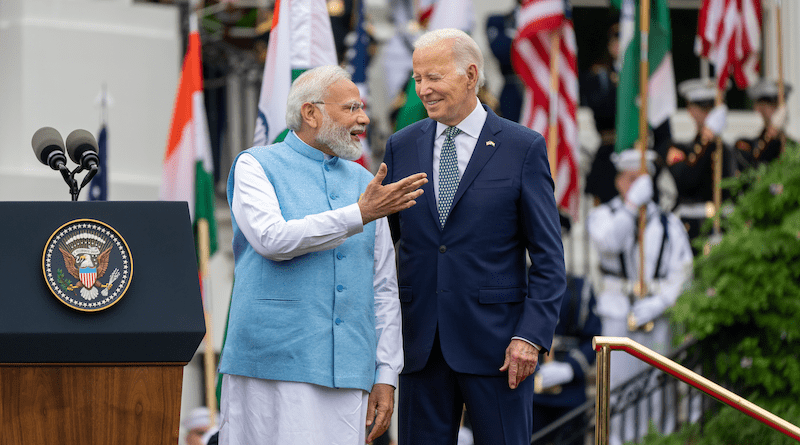The US-India Partnership: A Critical Examination – OpEd
In recent times, the partnership between the United States and India has gained significant attention and scrutiny, raising important questions about its implications for global politics, human rights, and democracy. Arundhati Roy, a renowned Indian author and activist, has taken a powerful stance against this alliance, shedding light on the erosion of democracy under the leadership of Prime Minister Narendra Modi and exposing the complexities that underlie this seemingly strategic partnership.
In her incisive critique, Roy emphasizes the paradox of the US-India partnership. While the alliance is often portrayed as a union of democratic nations sharing common values, Roy highlights the uncomfortable reality that India’s democratic fabric is gradually unraveling under the rule of Prime Minister Modi. The erosion of civil liberties, discrimination against minorities, and the rise of majoritarianism have cast a shadow over India’s democratic image. It is against this backdrop that the partnership takes on a new complexion, raising concerns about the principles and values that guide international alliances.
Prime Minister Modi’s tenure has been marked by a consolidation of power that has alarmed many observers. The rise of Hindu supremacism and the marginalization of religious and ethnic minorities have raised alarm bells about the trajectory of India’s domestic politics. Roy aptly points out that India is no longer a flourishing democracy, but rather a state teetering on the edge of becoming an electoral autocracy, where majoritarian sentiment often takes precedence over pluralism and diversity.
Roy’s cautionary words about the timing of elections in India are poignant. She describes this period as “murder season” and “lynching season,” highlighting the grim reality of targeted violence against minority groups, often fueled by political agendas. This underscores the dangerous confluence of divisive politics and unchecked violence, underscoring the need for international partners to be vigilant about their associations.
One of the most striking aspects of Roy’s critique is her emphasis on the role of the United States in this evolving partnership. She questions the morality and ethics of the US government’s embrace of the Modi regime, especially in light of the troubling trends that have unfolded under his leadership. The alliance has, in some ways, cast a shadow over the principles of democracy, human rights, and social justice that both countries claim to uphold.
Roy’s concern extends to the global implications of the US-India partnership, particularly as tensions between India and China continue to simmer. As two of the world’s most populous countries, their relationship has the potential to shape the geopolitical landscape for years to come. However, Roy argues that the US must tread carefully, acknowledging the fact that India’s internal dynamics are far from stable. In this delicate situation, aligning too closely with a regime that curtails freedoms and promotes divisiveness may not only jeopardize US interests but also risk amplifying global instability.
Ultimately, Arundhati Roy’s critique challenges us to look beyond the surface of international partnerships and consider the underlying currents that shape them. It prompts us to question the true motivations behind these alliances and to weigh the potential costs against the perceived benefits. Roy’s words are a reminder that the pursuit of strategic interests must not come at the expense of human rights, democracy, and social cohesion.
As global citizens, we have a responsibility to engage critically with the alliances that our nations forge. We must hold our leaders accountable for the partners they choose and the principles they uphold. The US-India partnership, as exposed by Arundhati Roy, serves as a call for introspection and reevaluation, a reminder that the pursuit of shared interests should never eclipse the fundamental values that underpin our societies. It is a reminder that the world is watching, and the choices we make today will shape the world we inhabit tomorrow.


Arundati Roy is a sponsored commi, sour grape China is afraid and wants to drive wedge in the US-India alliance via these biased journos. US helped China to become rich and almost developed, now it is helping India…a powerful democratic country, nothing wrong with it.